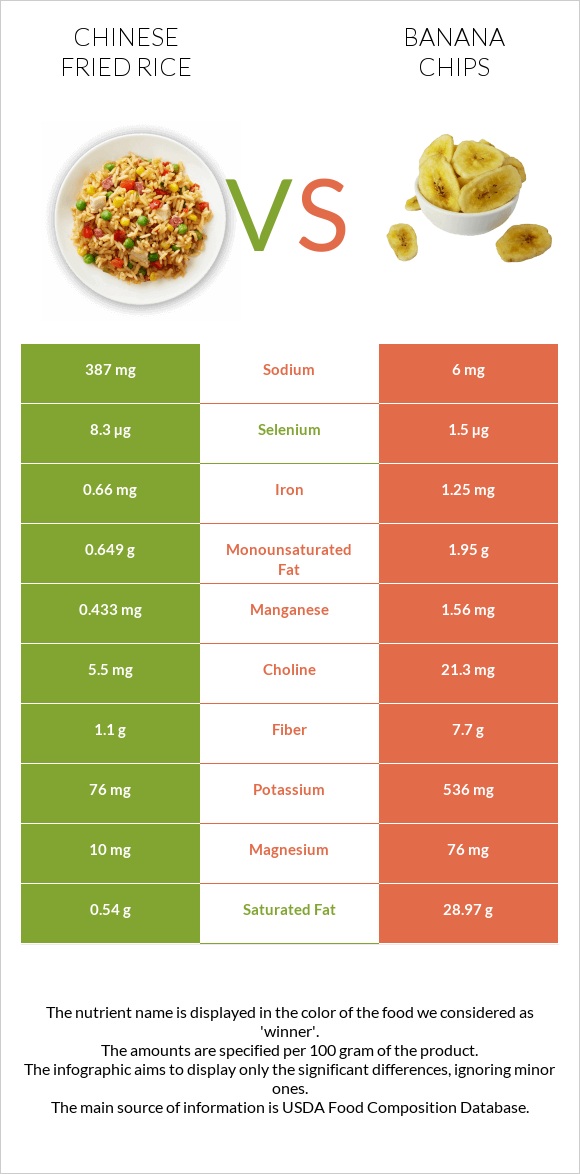Chinese fried rice vs. Banana chips — In-Depth Nutrition Comparison
Compare
Important differences between Chinese fried rice and banana chips
- Chinese fried rice has more selenium; however, banana chips are richer in manganese, fiber, vitamin B6, magnesium, potassium, copper, and iron.
- Banana chips' daily need coverage for saturated fat is 142% more.
- Chinese fried rice contains 65 times more sodium than banana chips. Chinese fried rice contains 387mg of sodium, while banana chips contain 6mg.
- Chinese fried rice has a higher glycemic index. The glycemic index of Chinese fried rice is 80, while the glycemic index of banana chips is 44.
The food varieties used in the comparison are Restaurant, Chinese, fried rice, without meat and Snacks, banana chips.
Infographic

Infographic link
Mineral Comparison
Mineral comparison score is based on the number of minerals by which one or the other food is richer. The "coverage" charts below show how much of the daily needs can be covered by 300 grams of the food.
| Contains more SeleniumSelenium | +453.3% |
| Contains more MagnesiumMagnesium | +660% |
| Contains more CalciumCalcium | +50% |
| Contains more PotassiumPotassium | +605.3% |
| Contains more IronIron | +89.4% |
| Contains more CopperCopper | +115.8% |
| Contains less SodiumSodium | -98.4% |
| Contains more ManganeseManganese | +260.3% |
Vitamin Comparison
Vitamin comparison score is based on the number of vitamins by which one or the other food is richer. The "coverage" charts below show how much of the daily needs can be covered by 300 grams of the food.
| Contains more Vitamin AVitamin A | +450% |
| Contains more Vitamin B2Vitamin B2 | +52.9% |
| Contains more Vitamin KVitamin K | +115.4% |
| Contains more Vitamin CVitamin C | +65.8% |
| Contains more Vitamin EVitamin E | +84.6% |
| Contains more Vitamin B1Vitamin B1 | +466.7% |
| Contains more Vitamin B3Vitamin B3 | +11.5% |
| Contains more Vitamin B6Vitamin B6 | +712.5% |
| Contains more FolateFolate | +133.3% |
All nutrients comparison - raw data values
| Nutrient |  |
 |
DV% diff. |
| Saturated fat | 0.54g | 28.97g | 129% |
| Manganese | 0.433mg | 1.56mg | 49% |
| Fats | 2.96g | 33.6g | 47% |
| Fiber | 1.1g | 7.7g | 26% |
| Vitamin B6 | 0.032mg | 0.26mg | 18% |
| Calories | 174kcal | 519kcal | 17% |
| Sodium | 387mg | 6mg | 17% |
| Magnesium | 10mg | 76mg | 16% |
| Potassium | 76mg | 536mg | 14% |
| Starch | 30.8g | 13% | |
| Copper | 0.095mg | 0.205mg | 12% |
| Selenium | 8.3µg | 1.5µg | 12% |
| Vitamin B5 | 0.62mg | 12% | |
| Carbs | 32.79g | 58.4g | 9% |
| Iron | 0.66mg | 1.25mg | 7% |
| Cholesterol | 18mg | 0mg | 6% |
| Vitamin B1 | 0.015mg | 0.085mg | 6% |
| Protein | 4.05g | 2.3g | 4% |
| Vitamin C | 3.8mg | 6.3mg | 3% |
| Choline | 5.5mg | 21.3mg | 3% |
| Monounsaturated fat | 0.649g | 1.95g | 3% |
| Polyunsaturated fat | 1.111g | 0.63g | 3% |
| Vitamin A | 22µg | 4µg | 2% |
| Folate | 6µg | 14µg | 2% |
| Calcium | 12mg | 18mg | 1% |
| Phosphorus | 51mg | 56mg | 1% |
| Vitamin E | 0.13mg | 0.24mg | 1% |
| Vitamin B2 | 0.026mg | 0.017mg | 1% |
| Vitamin K | 2.8µg | 1.3µg | 1% |
| Net carbs | 31.69g | 50.7g | N/A |
| Sugar | 0.56g | 35.34g | N/A |
| Zinc | 0.72mg | 0.75mg | 0% |
| Vitamin B3 | 0.637mg | 0.71mg | 0% |
| Trans fat | 0.011g | N/A | |
| Tryptophan | 0.052mg | 0.027mg | 0% |
| Threonine | 0.173mg | 0.076mg | 0% |
| Isoleucine | 0.173mg | 0.074mg | 0% |
| Leucine | 0.335mg | 0.158mg | 0% |
| Lysine | 0.173mg | 0.107mg | 0% |
| Methionine | 0.114mg | 0.024mg | 0% |
| Phenylalanine | 0.225mg | 0.086mg | 0% |
| Valine | 0.251mg | 0.104mg | 0% |
| Histidine | 0.094mg | 0.18mg | 0% |
| Fructose | 0.05g | 0% | |
| Omega-3 - DHA | 0.002g | 0g | N/A |
| Omega-3 - ALA | 0.111g | N/A | |
| Omega-6 - Gamma-linoleic acid | 0.002g | N/A | |
| Omega-6 - Eicosadienoic acid | 0.001g | N/A | |
| Omega-6 - Linoleic acid | 0.981g | N/A |
Macronutrient Comparison
Macronutrient breakdown side-by-side comparison
Protein:
4.05 g
Fats:
2.96 g
Carbs:
32.79 g
Water:
59.09 g
Other:
1.11 g
Protein:
2.3 g
Fats:
33.6 g
Carbs:
58.4 g
Water:
4.3 g
Other:
1.4 g
| Contains more ProteinProtein | +76.1% |
| Contains more WaterWater | +1274.2% |
| Contains more FatsFats | +1035.1% |
| Contains more CarbsCarbs | +78.1% |
| Contains more OtherOther | +26.1% |
Fat Type Comparison
Fat type breakdown side-by-side comparison
Saturated fat:
Sat. Fat
0.54 g
Monounsaturated fat:
Mono. Fat
0.649 g
Polyunsaturated fat:
Poly. Fat
1.111 g
Saturated fat:
Sat. Fat
28.97 g
Monounsaturated fat:
Mono. Fat
1.95 g
Polyunsaturated fat:
Poly. Fat
0.63 g
| Contains less Sat. FatSaturated fat | -98.1% |
| Contains more Poly. FatPolyunsaturated fat | +76.3% |
| Contains more Mono. FatMonounsaturated fat | +200.5% |



